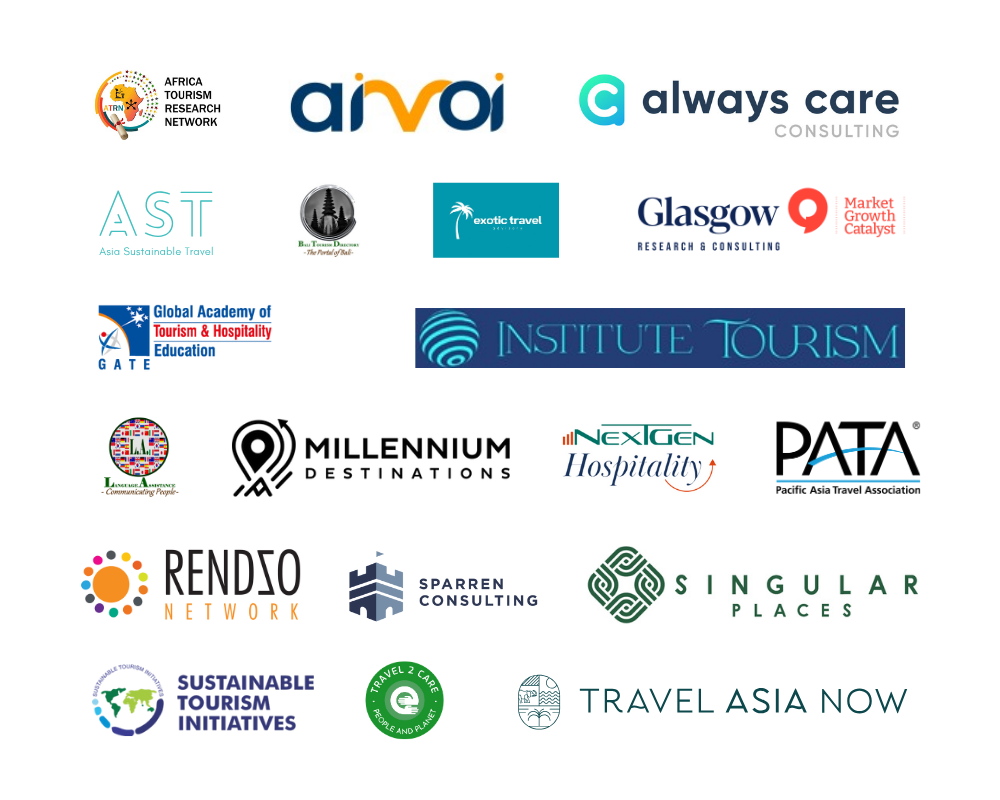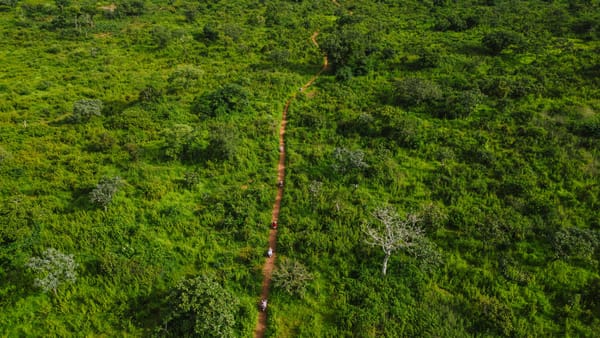The travellers are back, but the staff is not.


Dear reader,
employees working in tourism and hospitality service-providing companies, organisations, and institutions are often overlooked in discussions and recommendations for a more sustainable and regenerative tourism. Not changing the linen in a hotel is an easy way to combine cost reduction and “green” behaviour. Paying fair wages and offering year-round employment and clear career paths is not so high on the agenda of both academic and industry discourse.
The consequences of leaving out this stakeholder, one of the six recognised in the Meaningful Tourism Paradigm, have become visible especially after the pandemic. Around the world, staff is hard to find and young people are more reluctant to enter the industry or enrol in tourism and hospitality university courses.
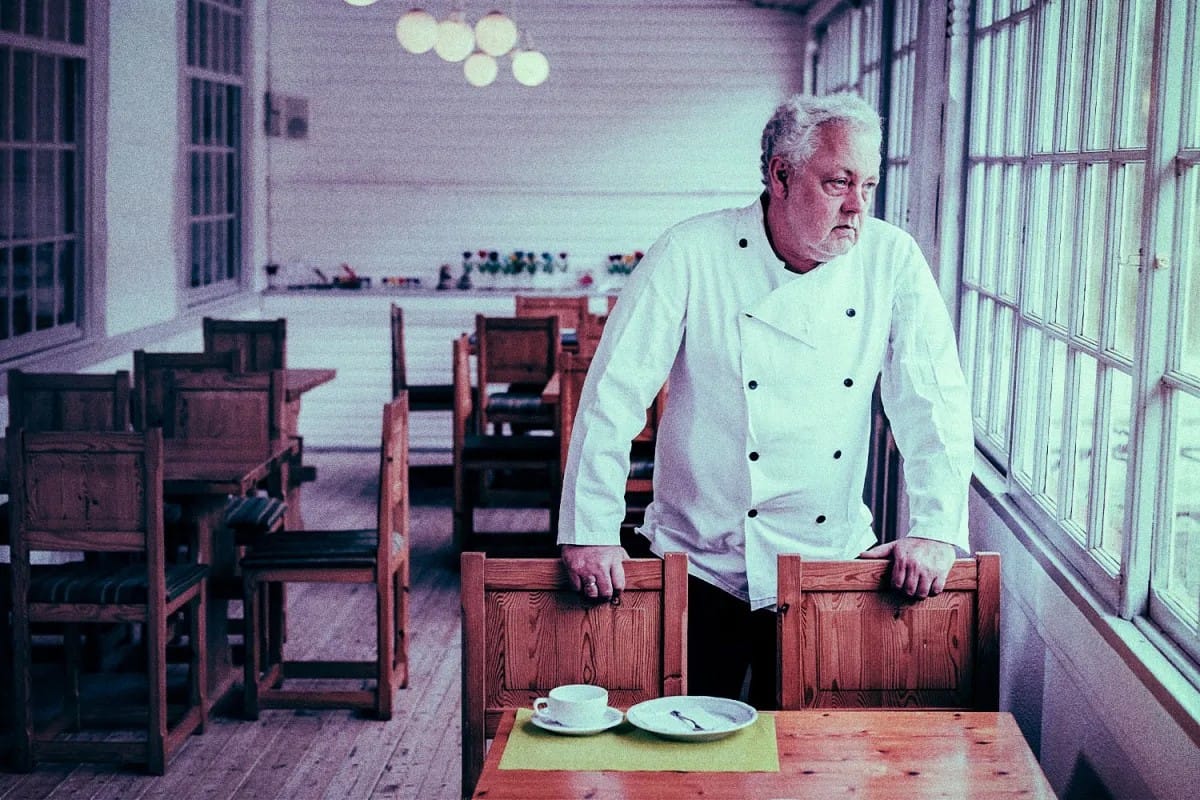
Germany is the third biggest tourism market in terms of revenue after the USA and China according to recent WTTC statistics, almost three million people are working in tourism and hospitality. Domestic and international demand is almost back to 2019 levels, with more than 37 million international arrivals in 2024. Still, the industry is suffering from decreasing turnover. The total industry result in May 2025 was 4.6% lower than in the previous month and 4.0% lower than in May 2024. Hotels suffered the most, with a 7% decrease in revenue.
The reason: The customers and guests are back, but the staff is not.
For example, in the coastal areas of Germany, bakeries are often closed during the main season or only open at 10 a.m. In Westerland, capital of the island of Sylt, the No. 1 celebrity destination in Germany, bread rolls and pastries are available in a vending machine.
Many restaurants no longer open for lunch. One reason is the changing consumption habits of German tourists, who more often than in previous times skip lunch for health and monetary reasons. However, the main trigger is again a lack of chefs and waiters for the daytime shift. In some beach resort cities, tourists complained about the fact that all restaurants close their kitchens by 8 p.m. during a time when the sun is up in the sky until 10 p.m.
Not only did many employees, who were made redundant during the coronavirus crisis, not return to the catering industry. Many found jobs in other industries with regular working hours, similar wages, and without being treated rudely by customers or management. At the same time, there are few new starters, as tourism and hospitality are no longer considered a low-risk industry. Based on experiences during the COVID-19 pandemic, hospitality jobs are becoming increasingly complex and demanding, making them more stressful and risky for employees.
The province adjacent to the Baltic Sea welcomed a record number of visitors last year. At the same time, the number of people employed in restaurants in the province fell by 1%.
As a result, turnover drops, the remaining staff are overworked, and the guests are frustrated and disappointed. Without providing objective benefits and subjective satisfaction to all stakeholders, including those working in the industry, the problem will persist. AI might replace some humans in back-office jobs; however, customers will still prefer to get their Brötchen from a nice smiling salesperson, who will accept cash payments, instead of a vending machine.
Fortunately, the number of people spreading the word about Meaningful Tourism is constantly rising.
After last week's workshop, the Meaningful Tourism Centre (MTC) happily provided certification to eleven additional trainers for the Meaningful Tourism Transformative Game Workshop. You can find more details about them in the MTC News section below.
In the upcoming editions of Meaningful Tourism Weekly, we will interview each of them to learn more about their background and the framework for supporting Meaningful Tourism in their respective countries.
Almost 50 Certified trainers are now offering a deep and action-oriented introduction to the Meaningful Tourism tools in all parts of the world, aiming for a better future of destinations, companies, and organisations. The next group is already awaiting certification, which will also close the gap in trainers for the Americas in the near future, following India.
As always, all best wishes from Prof. Dr. Wolfgang Georg Arlt and the entire Meaningful Tourism Weekly team in Kathmandu and in Manila!


Repositioning a destination in the direction of Meaningful Tourism – Best Practice Example: Sri Lanka
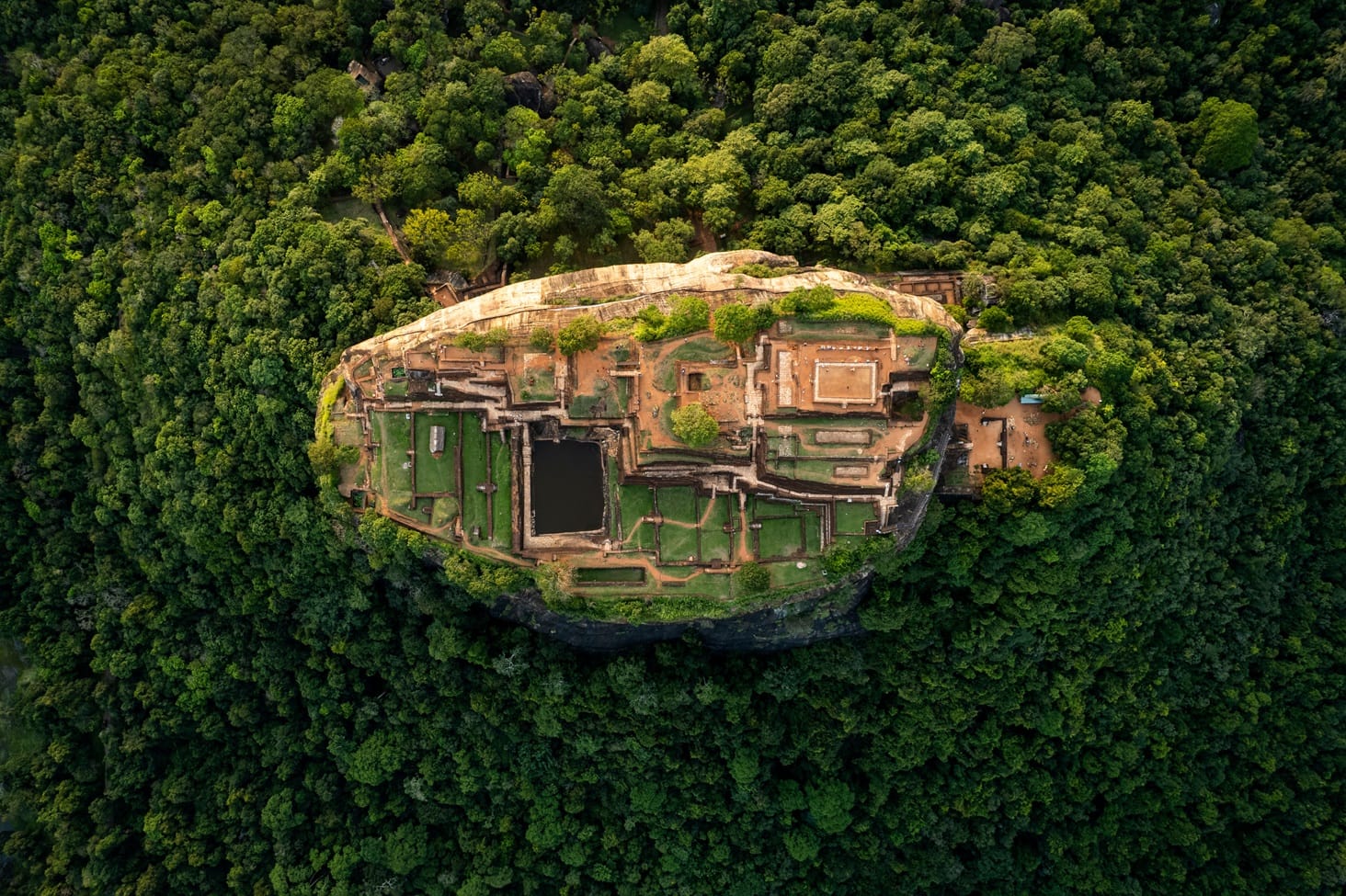
Many destinations went back to “business as usual” after the pandemic, more or less ignoring the substantial changes needed to react to the Climate Breakdown, the rise of AI, and the differences in demand.
Sri Lanka, however, is making an effort to position itself as a rising star in sustainable travel. Suffering three serious crises, including the terrorist attacks in 2019, the COVID-19 lockdowns, and the economic upheaval in 2022, the island state has nevertheless managed to initiate a remarkable process of recovery and strategic repositioning.
The government is still counting on growth, this time, however, combining a 50% growth from two to three million international arrivals with a 60% growth in earnings, hoping to use the sustainable development for a shift towards higher-value tourism.
“Sri Lanka doesn’t have competitors; it is a unique country… a small island [that] offers a wide range of tourism experiences,” said Chinthana Duminduhewa, Certified Meaningful Tourism Transformational Game Workshop trainer and a well-known sustainable tourism expert, during ITB Berlin a few months ago.
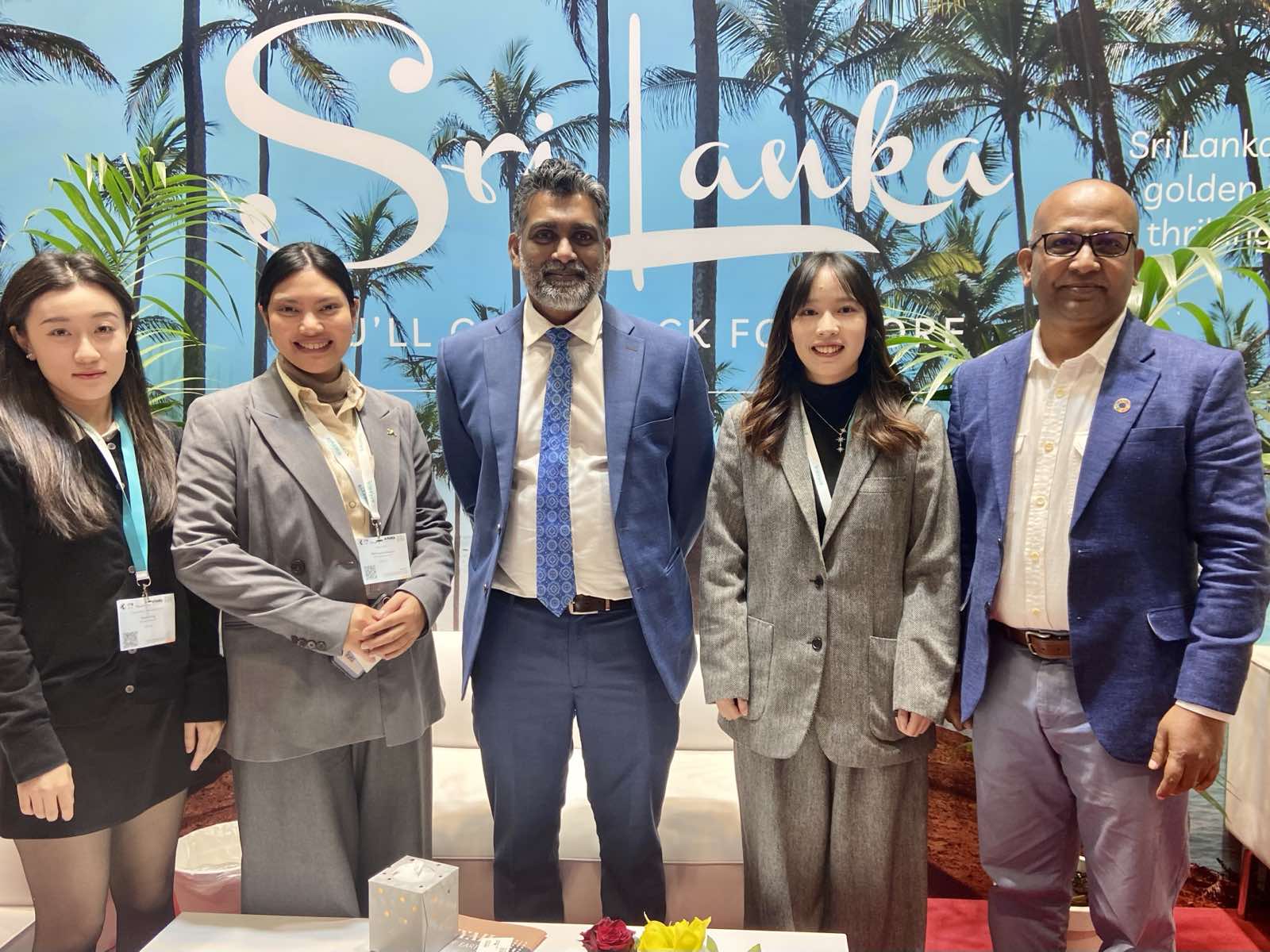
Actions taken include easing visa procedures for key markets and aiming at a more diversified market mix in terms of source markets and in terms of tourism segments, focusing on putting “quality over quantity”. Connectivity improvement is another foundation for sustainable growth, with air transport being the primary path to follow for the island. Accordingly, Colombo’s Bandaranaike International Airport is expanding services, and new connections with hubs like Dubai, Hong Kong, and Singapore have been created.
For inland transport, a Chinese-built network of highways is gradually expanding, and the railway system is being upgraded.
Instead of chasing record numbers at any cost, the country is rebuilding a resilient, upmarket brand that can command higher spending per visitor while preserving the very assets that make it attractive.
A new national certification process designating “Sustainable Destinations” has been started by the government, while more than 200 local businesses have joined the “Good Travel” program for sustainability.
New sustainable product offerings are created, ranging from rainforest treks to agro-tourism in tea country, providing immersive experiences for visitors while benefiting the surrounding communities, empowering local entrepreneurs, and preserving cultural sites.
Sri Lanka is not alone in the region.
Places like Thailand, Bali, and Vietnam are big competitors, as observed by Hashan Cooray, Marketing Director at Jetwing Hotels, a pioneer in sustainable tourism in Sri Lanka. However, Sri Lanka’s strategy isn’t to compete with Thailand or Vietnam in volume, but rather to differentiate itself based on value, authenticity, and sustainability.
In comparison with the Maldives, another regional competitor may have more luxury resorts, but cannot offer holistic experiences that combine culture, nature, and people, promoting authentic experiences and sustainable growth over mass tourism.
These steps towards a Meaningful Tourism approach will change the image of the island from a budget beach destination into a high-quality, conscious travel destination.
Challenges remain: More investment in sustainability is needed, as in many destinations, the empowerment and training of local communities and the hospitality workforce are lacking, and effective storytelling is necessary to convey the message to the market.
Alignment of interests and public-private collaboration developing a national tourism vision are needed to ensure that all stakeholders work towards common goals.

Meet the Trainer for the Meaningful Tourism Transformative Game Workshop

Ropafadzaishe Rushwaya is a passionate and purpose-driven hospitality and tourism professional with over a decade of experience spanning luxury lodges, destination marketing, and guest relations.
Deeply committed to sustainable tourism models that uplift local communities and protect natural environments, she has become an advocate for practices that balance economic growth with cultural and ecological responsibility.
Holding dual Master’s degrees in Tourism & Hospitality and Strategic Management, she combines strategic vision with hands-on execution to drive meaningful change. Her dedication has been recognized with the 2024 Presidential Award from the Hospitality Association of Zimbabwe.
Today, she continues to lead initiatives that promote sustainability, empower local talent, and shape a resilient, inclusive future for tourism.
The Meaningful Tourism Weekly asked Ropa: What is the current situation of tourism in Zimbabwe, and how can the Meaningful Tourism Paradigm help to support its development?
Her answer:
Zimbabwe’s tourism industry remains anchored in its rich natural and cultural heritage. Visitors are drawn to iconic sites such as the wildlife-rich national parks of Mana Pools, Hwange, and Gonarezhou; the spectacular Victoria Falls; and the ancient Great Zimbabwe Monuments, which testify to early African civilization. Beyond these renowned attractions, it is the warmth, smiles, and vibrant culture of Zimbabwe’s people that leave a lasting impression on tourists.

Over the years, Zimbabwe’s tourism landscape has evolved, influenced by both positive developments and external challenges. Economic fluctuations, global crises, and local constraints have affected visitor arrivals and investment. Yet, the government and the Ministry of Tourism are actively working to transform the sector by boosting GDP contribution and increasing tourist numbers through targeted strategies.
Initiatives include the “ZimBhoo” campaign, which encourages domestic tourism, promotes MICE (Meetings, Incentives, Conferences, and Exhibitions) tourism, and hosts high-profile events such as the UN Gastronomy Conference. Campaigns such as Amai’s Cookout have also successfully highlighted Zimbabwe’s culinary heritage and cultural richness nationwide.
The Meaningful Tourism paradigm supports this transformation by ensuring that all stakeholders truly benefit from tourism. Local women and children earn an income by selling arts, crafts, and handmade products; men benefit by carving and marketing stone sculptures; and investors help expand employment opportunities by building new hotels and lodges. The agricultural sector finds steady markets for fresh produce through tourism outlets, while universities and lecturers enhance their curricula and research focused on sustainable, inclusive tourism.
Ultimately, Meaningful Tourism promotes fair distribution of tourism’s benefits, values local culture and environment, and encourages collaboration across sectors. By integrating these principles, Zimbabwe’s tourism can grow not only in numbers but also in resilience, quality, and positive impact for communities and the nation as a whole.


Meaningful Tourism Expert Skills and Experiences Matrix

We have introduced the Meaningful Tourism Expert Skills and Experiences Matrix, which provides information about the wide range of skills and experiences that can be used for the Implementation Support of Meaningful Tourism strategies in various forms.
You can find the Matrix on the MTC website.
Last week, MTC certified eleven more trainers for the Meaningful Tourism Transformative Game Workshop.
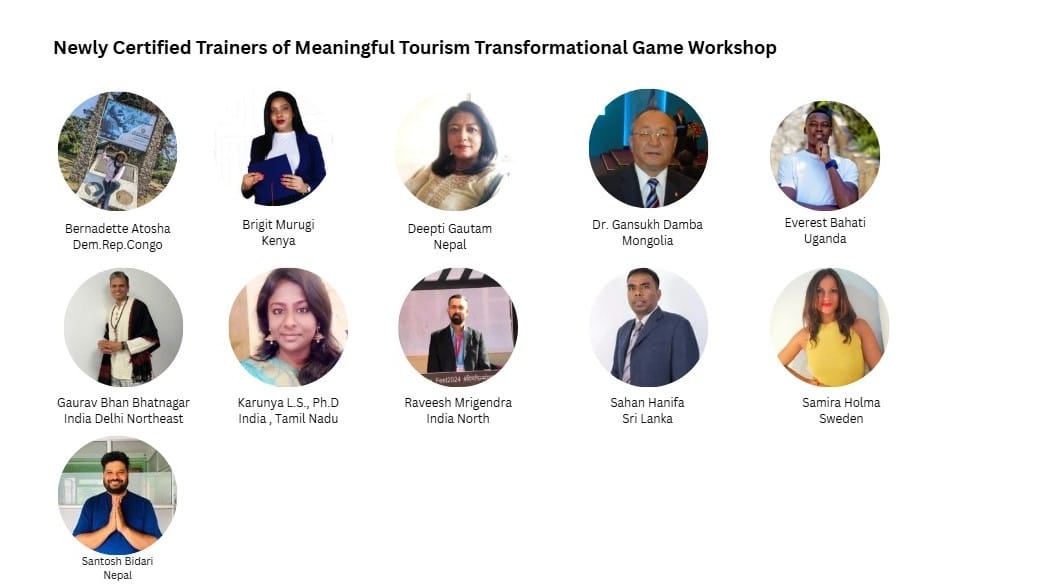
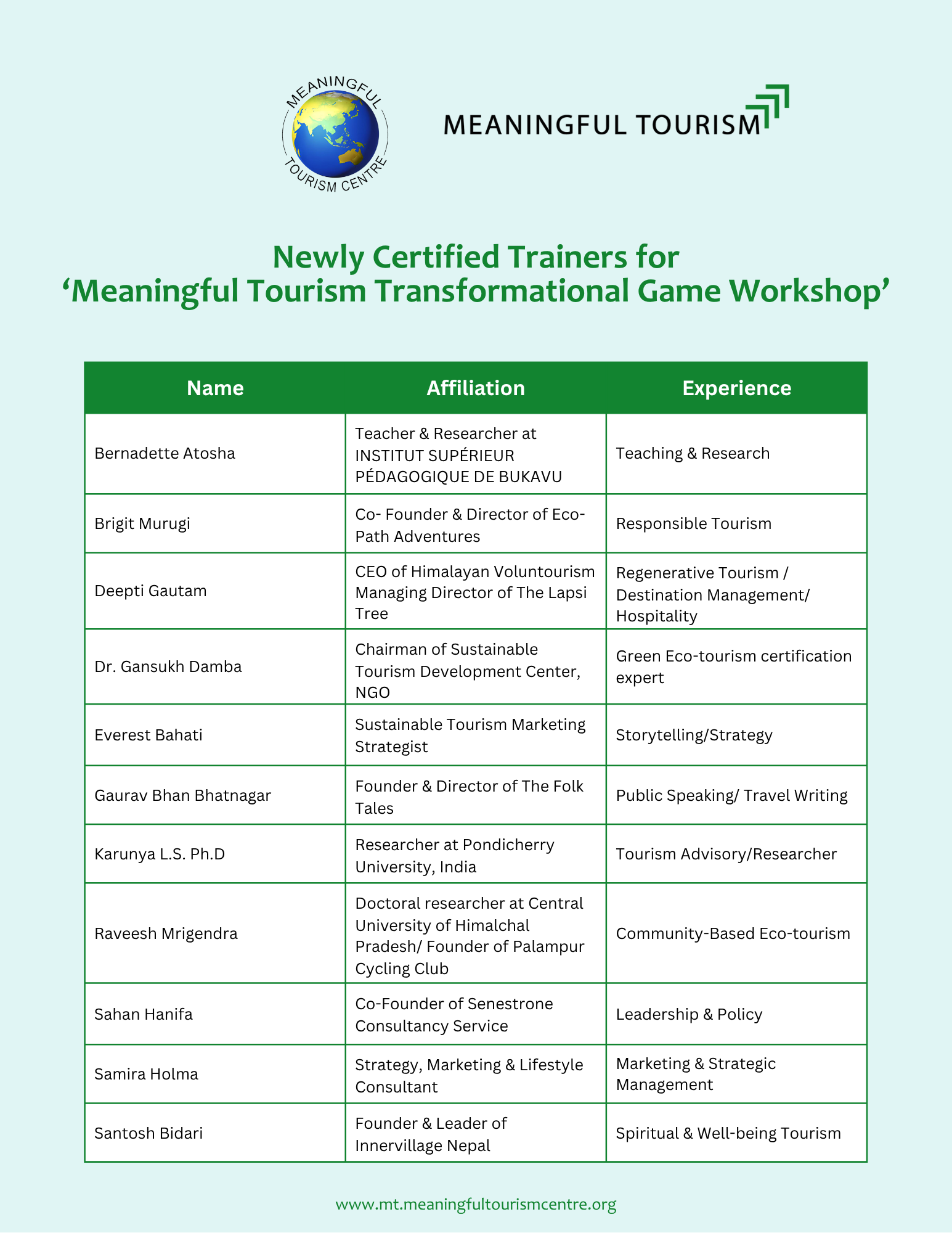
MTC continues to look for professionals with experience in training or lecturing and a passion for sustainable tourism.
If you are interested in participating, Meaningful Tourism Transformational Game Workshops are offered in August in Bangkok and in November in London. Details are provided in the Events section below.
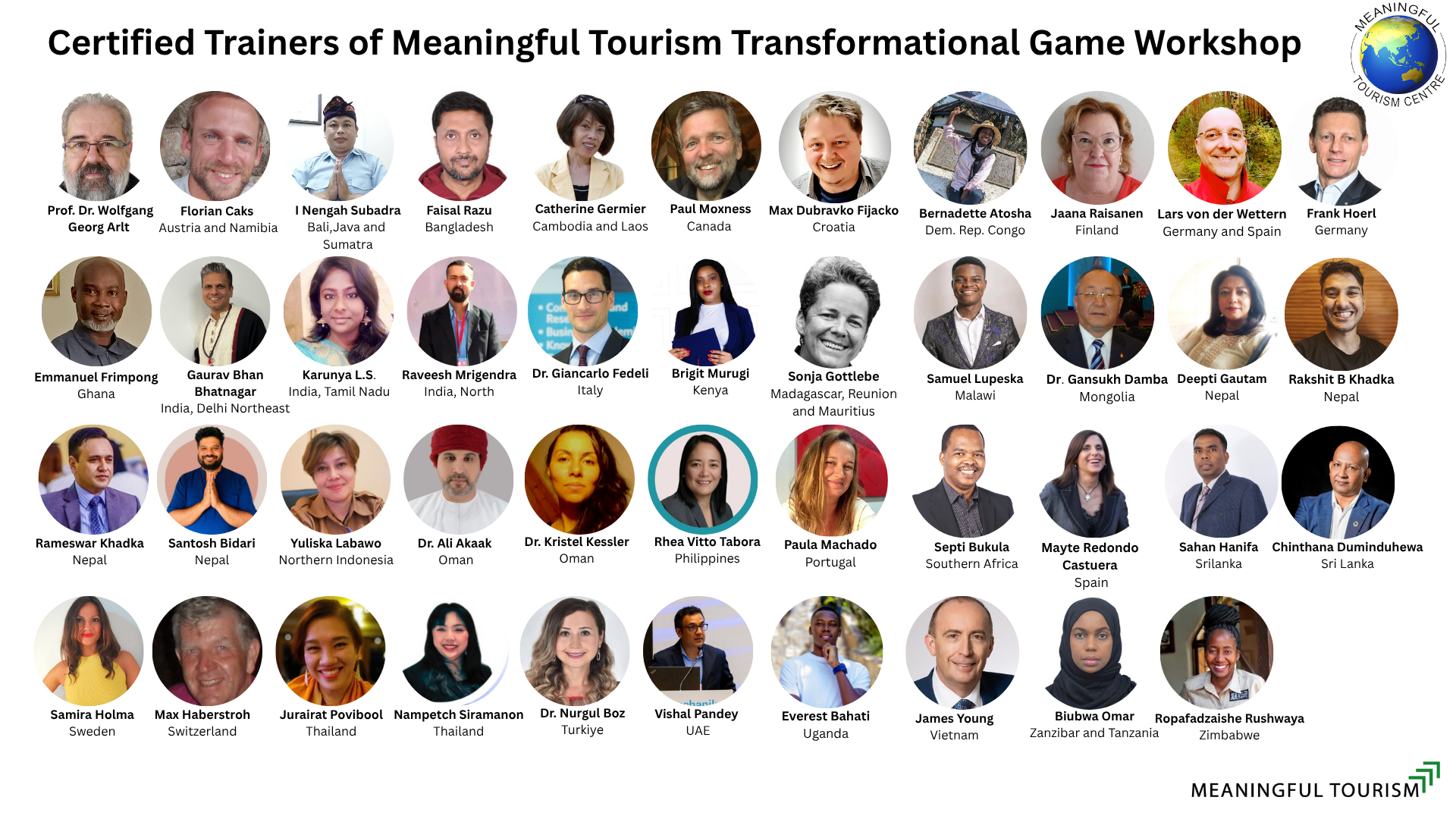
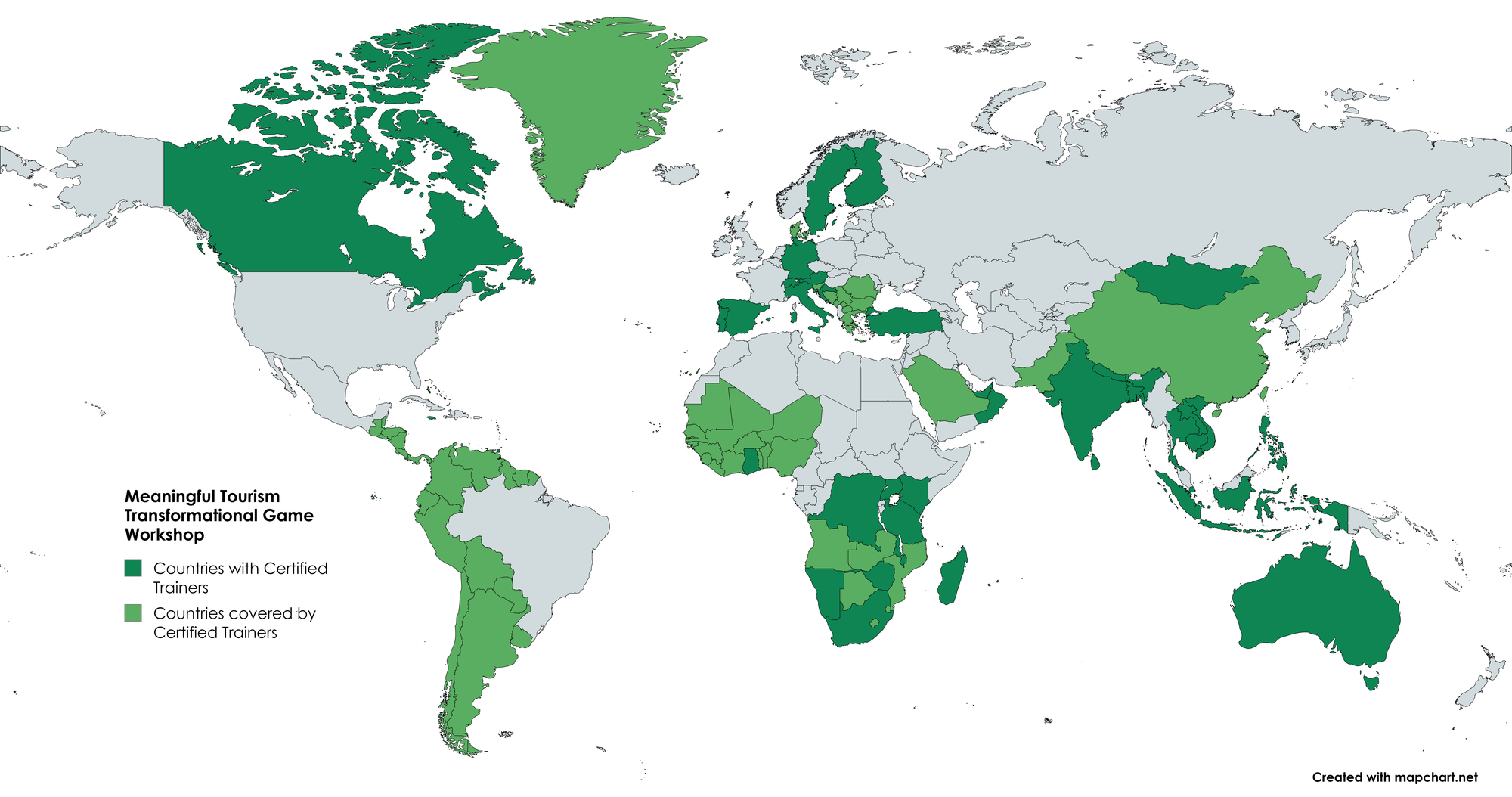

Destination diversity – the first step to reduction
The shrinking extent of biodiversity is one of the most threatening effects of the climate crisis.
However, the world is also starting to see the shrinking process of destination diversity, with Tuvalu as the first victim.

Tuvalu, a group of nine islands in the South Pacific with approximately 11,000 inhabitants, is sinking. The islands are located less than five meters above sea level.
Thinly populated atolls and reef islands with palm-fringed beaches, as well as the capital Funafuti, will soon disappear.
Bad for tourists, but of course much worse for the inhabitants. More than half of them applied for an Australian migration visa. The first 280 of them were chosen by ballot to receive the first-ever migration visa based on climate change.
"This is the first agreement of its kind anywhere in the world, providing a pathway for mobility with dignity as climate impacts worsen," Australian government representatives told the magazine New Scientist in a statement.

Earth Overshoot Day
Today, July 24th, 2025, is Earth Overshoot Day.
In 1971, approximately 3.8 billion people lived on Planet Earth, and 180 million international tourism trips were recorded. This year also marks the point in time when human consumption reached 100% of the renewable resources our planet can produce in one year. Since then, the population has about doubled; however, the number of international trips increased eightfold.
Since 1971, Earth Overshoot Day marks the date when humanity’s demand for ecological resources and services in a given year exceeds what Earth can regenerate in that year. It has moved farther and farther away from equilibrium.
In the last five years alone, the date moved almost one month further up the calendar. In 2025, it falls on 24 July.
To determine the date of Earth Overshoot Day, the Global Footprint Network, an international research and non-profit organization, combines data to assess humanity’s resource situation.
This development is not a reflection of the increase in the number of human beings, as a closer examination of the Overshoot Days for different countries reveals.
Qatar has already reached this day on February 6th, while Luxembourg and Singapore are also arriving at their limit within February. These places are not only using up 1.8 Earth's resources like the global average, but more than six times the annual capacity. The United States, Canada, Australia, and the UAE are not far behind in the first half of March.
The Geneva Environment Network even provides a personal calculator to help you determine your personal overshoot day. For most of us working in the tourism industry, the result will probably be quite sobering.


Meaningful Tourism Transformational Game Workshop at PATA Travel Mart, Bangkok
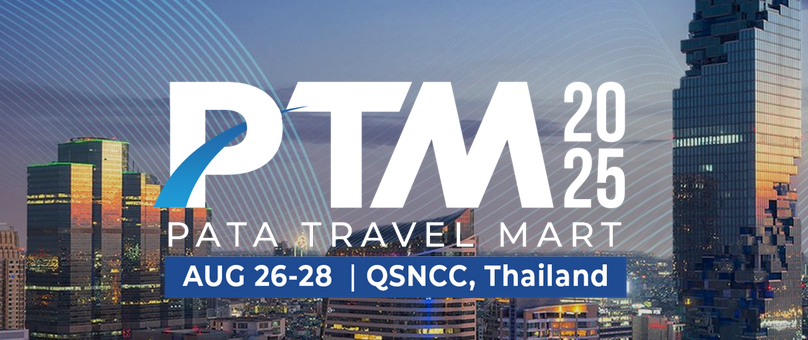
PATA Travel Mart (PTM) is one of Asia Pacific’s longest-standing international travel trade exhibitions featuring networking and contracting opportunities to help travel and tourism organisations access decision-makers, meet new clients, expand their networks, establish new relationships, and consolidate existing business partnerships.
PTM will take place at Queen Sirikit National Convention Center (QSNCC) in Bangkok, Thailand, from August 26 to 28, 2025.
On August 26, one of the conference topics will be Meaningful Tourism and the way to a Meaningful Pacific-Asia Tourism Economy, as outlined in the PATA Vision statement. For details on how to participate, please visit PATA Travel Mart 2025.
The Meaningful Tourism Centre (MTC) will host a special Meaningful Tourism Transformational Game Workshop on August 25, 2025, the day before the PTM 2025 begins. The workshop will run from 9:00 to 16:00 h and will be conducted by Prof. Dr. Wolfgang Georg Arlt FRGS FRAS, founder of MTC, together with the Meaningful Tourism trainer for Thailand.
There are only 30 seats available, so if you already know that you will attend PTM 2025, please ensure you arrange your schedule to arrive on time for the training workshop on Monday, August 25th. Book your seat now to enjoy the Early Bird fee. Venue: QSNCC Bangkok, details to be advised. Transport from/to the hotel or QSNCC can be arranged on request at a special rate.
Early Bird participation fee for bookings paid before August 15, 2025: USD 175 per person
Full participation fee for bookings after August 15, 2025: USD 200 per person
VAT included if applicable.
PATA members (including PATA chapter members) enjoy a 15% discount.
Two or more seats booked at the same time enjoy an additional 10% discount.
Please note that payments are non-refundable. However, a change of participant is possible without additional fee until one day before the training workshop.
The participation fee includes training workshop participation, a certificate of participation, one year of free access to all content, including the Meaningful Tourism Weekly Library reserved for paid subscription holders, coffee/tea, cookies, and a vegetarian and non-vegetarian lunch buffet.
For bookings, please contact us at office@meaningfultourismcentre.org.
Bookings will be closed once 30 reservations have been reached. Book today and enjoy the Early Bird fee.
Meaningful Tourism Transformational Game Workshop at World Travel Market, London
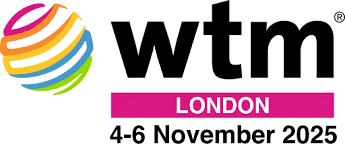
World Travel Market (WTM) in London is one of the must-attend annual events for key players in the tourism industry. The Meaningful Tourism Centre will offer a special Meaningful Tourism Transformational Game Workshop on the day before the start of WTM 2025, on November 3, 2025, from 9:00 to 16:00 hours. The workshop will be conducted by Prof. Dr. Wolfgang Georg Arlt FRGS FRAS, the founder of MTC.
There are only 30 seats available, so if you already know that you will attend WTM 2025, make sure you arrange your schedule to arrive on time for the training workshop on Monday, November 3, 2025.
Book your seat now and enjoy the Early Bird fee.
Venue: Central London, details to be advised. Transport from/to the hotel or Excel London can be arranged on request at a special rate.
Early Bird participation fee for bookings paid before September 30, 2025: 175 Euros per person
Full participation fee for bookings starting October 1, 2025: 200 Euros per person
VAT included if applicable.
Two or more seats booked at the same time enjoy an additional 10% discount.
Please note that payments are non-refundable. However, a change of participant is possible without additional fee until one day before the training workshop.
The participation fee includes training workshop participation, a certificate of participation, one year of free access to all content, including the Meaningful Tourism Weekly Library reserved for paid subscription holders, coffee/tea, cookies, and a vegetarian and non-vegetarian lunch buffet.
On the evening of November 3, 2025, there will also be a (self-paid) dinner followed by drinks with an opportunity to network with participants and to meet several of the Meaningful Tourism trainers from different countries.
For bookings, please contact office@meaningfultourismcentre.org.
Bookings will be closed once 30 reservations have been reached. Book today and enjoy the Early Bird fee.
About Meaningful Tourism Weekly
Meaningful Tourism Weekly, published every Thursday by Meaningful Tourism Centre (MTC) - London and Kathmandu, recently partnered with Travel Asia Now, led by Rhea Vitto Tabora. This collaboration enhances the newsletter’s professional production and distribution, bringing added value to our readers.
Each issue features the Meaningful Tourism Weekly Editorial, updates on MTC activities, a Best Practice Example, a portrait of an MTC-certified trainer, news about upcoming events, and occasionally additional op-ed pieces from guest authors. Carefully selected news items, including videos and podcasts, are also included, along with links to their original sources in the Meaningful Tourism News section.
Subscription to Meaningful Tourism Weekly is free, with the addition of a paid content section that includes a library of surveys, exclusive articles, conference presentations, and statistical data, offering subscribers invaluable resources.
Sponsorship opportunities are available for those interested in supporting this initiative.
For more information about MTC's trainings, market research, product adaptation, consulting services, conferences, strategy development, and marketing, visit our website or email us at info@meaningfultourismcentre.org.

